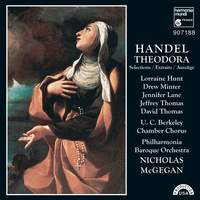3.00 pm
Building a Library
Kirsten Gibson chooses her favourite recording of George Frideric Handel's Theodora.
As Judas Maccabaeus, The Occasional Oratorio and Joshua showed, Handel certainly knew how to write a chauvinist, tub-thumping hit of an oratorio; with its contrasts between the reflective and the grand and ceremonial, Messiah was an instant success. But for his penultimate oratorio, the 64-year-old Handel set a story of religious devotion and human dignity to music whose prevailing mood is its reflective inwardness. With music of unsentimental tenderness beautiful, contemplative arias are often matched with serene and poignant choruses as the story of spiritual strength and agonising loss unfolds.
In fourth-century Antioch, the noble woman Theodora refuses to join a pagan ritual in honour of the Roman emperor. Imprisoned and, condemned to a fate worse than death, Theodora is sent to the temple of Venus to be a prostitute. Didimus, a Roman soldier in love with Theodora and a secret Christian convert, changes clothes with her and takes her place in prison. But their plan is discovered and the oratorio ends as they await their martyrdom.
Much to Handel's chagrin, Theodora was a flop but today it's recognised as one of his greatest works, full of memorable and moving music.
Presto listing here:
Building a Library
Kirsten Gibson chooses her favourite recording of George Frideric Handel's Theodora.
As Judas Maccabaeus, The Occasional Oratorio and Joshua showed, Handel certainly knew how to write a chauvinist, tub-thumping hit of an oratorio; with its contrasts between the reflective and the grand and ceremonial, Messiah was an instant success. But for his penultimate oratorio, the 64-year-old Handel set a story of religious devotion and human dignity to music whose prevailing mood is its reflective inwardness. With music of unsentimental tenderness beautiful, contemplative arias are often matched with serene and poignant choruses as the story of spiritual strength and agonising loss unfolds.
In fourth-century Antioch, the noble woman Theodora refuses to join a pagan ritual in honour of the Roman emperor. Imprisoned and, condemned to a fate worse than death, Theodora is sent to the temple of Venus to be a prostitute. Didimus, a Roman soldier in love with Theodora and a secret Christian convert, changes clothes with her and takes her place in prison. But their plan is discovered and the oratorio ends as they await their martyrdom.
Much to Handel's chagrin, Theodora was a flop but today it's recognised as one of his greatest works, full of memorable and moving music.
Presto listing here:
Recommended version:
Louise Alder (Theodora), Tim Mead (Didymus), Anna Stéphany (Irene), Stuart Jackson (Septimius), Adam Plachetka (Valens)
Arcangelo
Jonathan Cohen (conductor)
Alpha ALPHA1025
Louise Alder (Theodora), Tim Mead (Didymus), Anna Stéphany (Irene), Stuart Jackson (Septimius), Adam Plachetka (Valens)
Arcangelo
Jonathan Cohen (conductor)
Alpha ALPHA1025








Comment